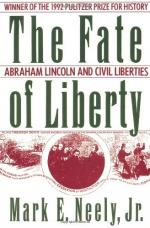
|
| Name: _________________________ | Period: ___________________ |
This test consists of 15 multiple choice questions and 5 short answer questions.
Multiple Choice Questions
1. Why does Lincoln feel the need to censure John Fremont?
(a) Fremont is a Confederate supporter.
(b) Lincoln believes Fremont is part of an assassination plot.
(c) Fremont is a Confederate spy.
(d) Fremont's actions are political and outside his realm of power.
2. Why does the author have difficulty confirming civilian arrest records?
(a) Many records are still sealed.
(b) The National Archive will not release military arrest records.
(c) Some records are missing, damaged or mixed with POW data.
(d) Many civillian arrest records were destroyed after the war.
3. In Chapter 8, why is an elderly man charged with violating his oath of allegiance to the Union?
(a) For attending his daughter's wedding in Missouri.
(b) For traveling to his son's funeral in Kentucky.
(c) For writing to his son in the Confederate Army.
(d) For whistling "Dixie" in public.
4. In 1862, which governor arrests 70 "vile secessionists" and essentially keeps these civilians as hostages?
(a) Francis Lieber.
(b) James McPherson.
(c) Andrew Johnson.
(d) Joel H. Silbey.
5. Which country continues to import cotton from the South during the Civil War?
(a) Mexico.
(b) Great Britain.
(c) Canada.
(d) France.
6. What book does James G. Randall write that criticizes Lincoln's habeas corpus policy?
(a) Arming the Suckers 1861-1865.
(b) Constitutional Problems under Lincoln.
(c) Mr. Lincoln's Forts.
(d) A Savage Conflict.
7. Why does Skipper F. N. Bonneau identify himself as a commissioned Confederate lieutenant?
(a) To be deported back to the South.
(b) To ensure safe passage through the blockade.
(c) To gain immunity as a POW.
(d) To spare his men.
8. How long are military courts allowed to try civilians?
(a) During and after the Civil War.
(b) Only during the Civil War.
(c) Before and during the Civil War.
(d) Before, during and after the Civil War.
9. How does Maryland protest the military arrest of citizens?
(a) By marching a group of women and children to the White House.
(b) By destroying railroads.
(c) By burning bridges.
(d) With satirical songs and pamphlets.
10. As a congressman in 1848, why doesn't Lincoln want to wait for a constitutional amendment?
(a) He prefers the use of presidential "express authority."
(b) He believes the amendment will be too weak.
(c) He fears Congress will not act in the best interests of the country.
(d) He believes Confederate spies are working within Congress.
11. According to "The American Cyclopaedia and Register of Important Events of the Year 1865," how many citizens are denied habeas corpus?
(a) 942.
(b) 38,000.
(c) 20,000.
(d) 13,535.
12. Which politician quotes Lord Coke by saying, "Where courts of law are open, martial law cannot be executed"?
(a) Clement Vallandingham.
(b) Horatio Seymour.
(c) George B. McClellan.
(d) Abraham Lincoln.
13. Which iron side steamship rams the USS Niphon?
(a) The CSS Merrimac.
(b) The USS Constitution.
(c) The Steamship Calhoun.
(d) The Ella and Annie.
14. In Chapter 6, which Pro-Lincoln historian is accused of generalizing the prisoners' danger?
(a) Joel H. Silbey.
(b) Frank Klement.
(c) James McPherson.
(d) James G. Randall.
15. According to Colonel F. C. Ainsworth's study, how many civilian prisoners were detained during the Civil War?
(a) 5,000-10,000.
(b) 112,000.
(c) 13,535.
(d) 38,000.
Short Answer Questions
1. Why do the consequences of the Emancipation Proclamation concern Lincoln more than the reactions to the suspension of the writ of habeas corpus?
2. According to John Quincy Adams, what gives Congress the power to abolish slavery?
3. Which famous politician addresses the mistreatment of unpopular minorities in the Lyceum Address?
4. In the "White Flag Affair," how does Union General Christopher C. Augur convince three Confederates to release his captured Union soldiers?
5. How does General Grant propose to exchange civilian hostages?
|
This section contains 619 words (approx. 3 pages at 300 words per page) |

|




